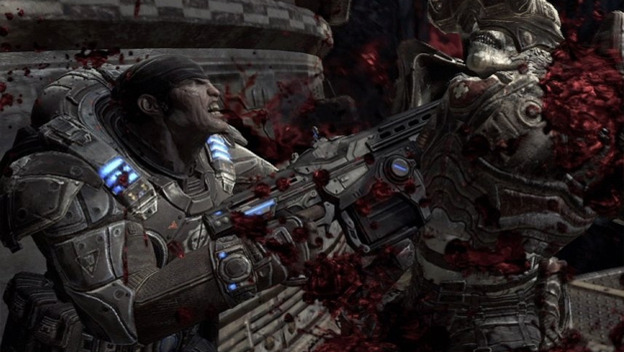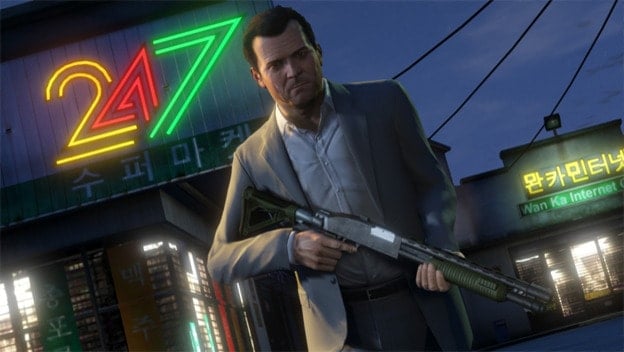Time for a reality check — and a healthy dose of honesty.
We live in a complex world. Every person you pass on the street, in your car during rush hour traffic, or in the crowded commuter train on the way home from the office has their own unique story and situation. Some of us look to escape the pressures of the real world by losing ourselves in entertainment. Others do it simply to avoid boredom. Regardless of the reason, most of us will find one unifying thread in almost all entertainment: violence. It’s true. Even if you only watch G-Rated Disney movies, at some point or another, you’re going to see violence in some form. Naturally, as video games are easy targets, they’re put under the microscope more often. Thus, it would seem that games are overly violent (or more so than other forms of entertainment).
But are they really? Is it a fair comparison? Perhaps other forms of media just do a better job of “packaging” their violence.
I took notice of this recently, when BioShock Designer Ken Levine made comments regarding the importance of violence being depicted realistically in art (like video games) during an interview. Levine said, “One of the responsibilities of art is to actually show this is what it looks like when someone gets shot, because it’s really obfuscated in media reports about war and violence…Violence, for better or for worse, is…going back to the dawn of narrative, is a part of the storyteller’s toolkit (in previous statements regarding the 2012 Sandy Hook shooting).” In this regard, Levine is not wrong. The very rating systems on how games and movies are predicated are based around very arbitrary standards. A person getting shot in a video game might only garner a T for Teen rating in some cases. However, show the results of the gunshot (the blood for example) and that same game can easily be slapped with an M for mature. Take that same scene and apply those standards to any number of TV shows currently on air, and you’ll find quite a different standard. It would seem that the moment you tie the violence to a consequence (especially in a game that people consider more “interactive”), the playing field starts to get a bit uneven. Levine soon felt the heat of his comments, which led him to make a clarification on his Facebook page: “What I was trying to say is that art, as a whole, has a number of responsibilities…One of those responsibilities (for art as a whole, not for every example of every piece of art ever produced), should be to show things as they are….For every movie that portrays valor in war (Saving Private Ryan), there are movies that focus on its most dehumanizing elements (Full Metal Jacket).”
Again, I reiterate: Levine is not wrong in his assertion. The question is; what role (if any) do the consequences of violence need to play in our entertainment?

To answer that question, you merely need to turn to your stack of video games, the DVD shelf or your favorite TV show currently housed on your iPhone or iPad. I think it’s safe to say that some, if not most, of what you find contains some type of violent content. Everyone knows the old saying “sex sells,” but I often wonder why the saying “violence sells more” isn’t as popular? One reason may be because people don’t notice it as much. It’s such a part of our culture, people just take it for granted (or stick their head in the sand to deny it). To say there’s a double standard in how people see violent content in games vs. what you see on USA or TNT, is an understatement. The point Levine was making is a valid one. Games have a way of depicting things in a realistic way, where you see the consequences of the violence immediately. A movie like James Bond (where 007 shoots eight guys who just fall from the rafters and disappear) doesn’t have the same impact. To the critics who say games present violence in a realistic way, I have to ask this question: is that a bad thing? The rationale is that violet games are conditioning young people to kill more easily (suggesting they’ve become desensitized). However, doesn’t a movie that depicts a homogenized version of someone’s death (without the messy fallout of blood and gore) do more to desensitize someone to the reality of violence?
The fact of the matter is, people are violent– and that’s why our entertainment is violent. I’ve touched on this in the past, and frankly, it’s hard to argue when you simply look to what fills our theaters, televisions and game consoles. Mortal Kombat wasn’t popular because of its innovative fighting mechanics; it was the fatalities. Take the chainsaw-melee kills out of Gears of War , and it would have been just another Sci-Fi shooter that no one cared about. I get a little tired of this ginned up, false sense of outrage we have to experience ever so often. It comes down to the fact that I don’t think some people are really being honest with themselves. Whether it’s realistically depicted, or presented in a cartoon fashion, violence is a key component in art and entertainment that we seem to crave.
As they say; art imitates life. If our art (and more specifically games) is violent, can’t that mean only one thing?
